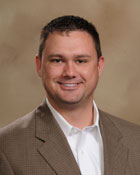
A University of Nebraska-Lincoln faculty member and a UNL alumnus are named Top 10 Industry leaders by The Cattle Business Weekly.
Matt Spangler, an assistant animal science professor and UNL Extension beef genetics specialist, is involved in statewide and national programming in beef cattle genetics and research in beef cattle quantitative genetics. He is also in charge of the university’s teaching herd, which is about 220 seedstock Angus and red and black SimAngus cattle.
One of Spangler's classes puts on the university’s annual bull sale
and he coordinates the Nebraska Youth Beef Leadership Symposium.
Through these programs, Spangler hopes to help shape the future of the beef industry. “I want to help develop and deliver science-based information related to genetic improvement to the beef industry to help aid in improving
profitability,” Spangler said in a story in the Cattle Business Weekly. “Currently there is
tremendous confusion surrounding the use of ‘newer’ genetic selection tools. My job is to help answer questions through science and help producers adopt and utilize tools that science has previously shown to work. I also want to inspire students to think critically and prepare them for challenges that we, as an industry, have not yet had to face. The only way I know how to do that is to challenge them, teach them how to think, communicate
and analyze problems in a logical manner.”
The other honoree is Erik Burken, a UNL graduate. Burken lives in Kaluga, Russia, overseeing the upstart of the Angus Genetics of Russia cowherd owned by Sergei Nitsenko.
Today, the herd numbers 3,500 breeding females on three different farms, most of which have been imported from America within the last three years. Nitsenko’s aim is to build a fully-integrated beef system, including two more farms, a feedlot and packing facility, to help re-establish Russia’s beef industry.
Burken told The Cattle Business Weekly his role is to lend his cattle expertise, design facilities and oversee building projects, assist with planning for the future, and most importantly, train the Russian workforce on everything from cattle care to
planting crops and putting up hay. He explains, “Most of the Russian workers do not have practical livestock management experience.”
More details at: http://bit.ly/AA4Eye